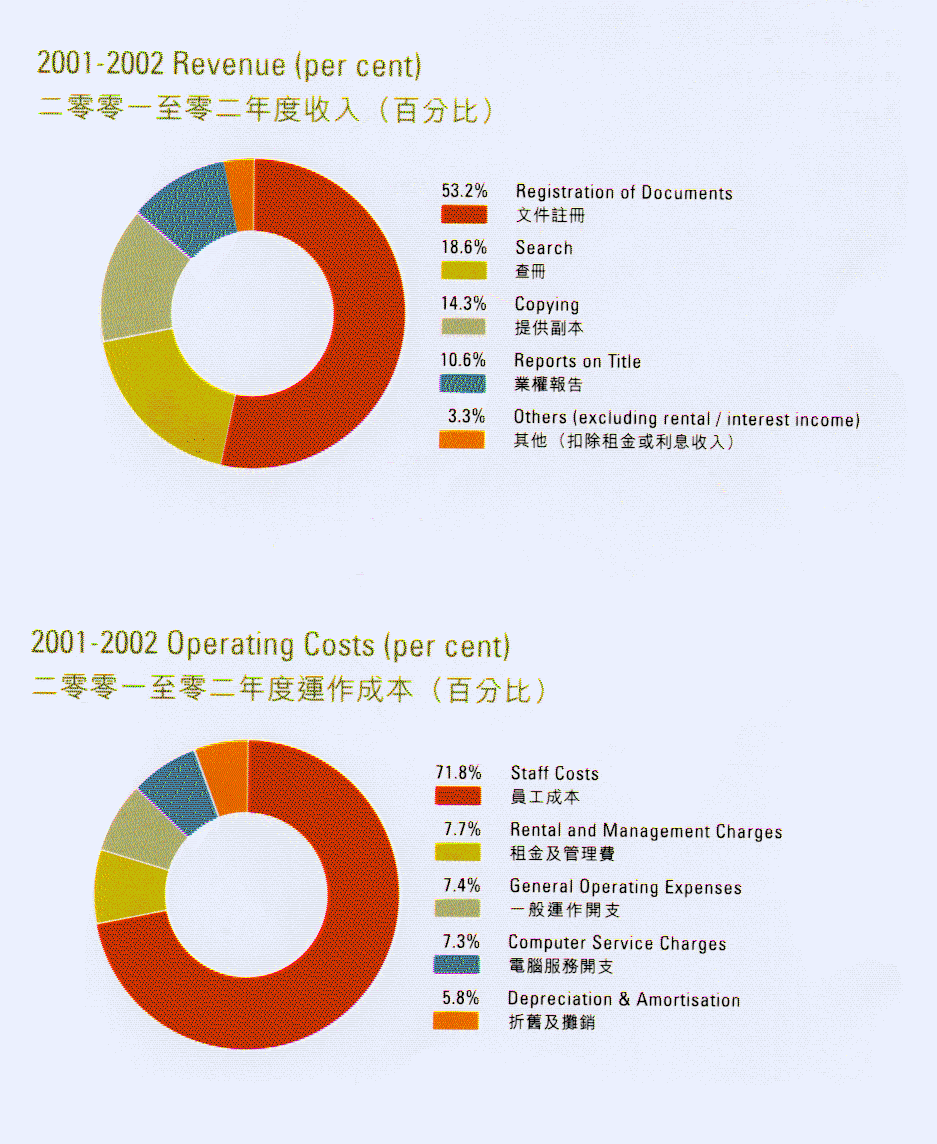There are three core principles that we believe best represent our organisation: Value, Service and Trust. These principles drive our performance and are the foundation of everything the
Land Registry does.
The Land Registry provides security for the homes of over half of Hong Kong's people - for many their most valuable physical possession. The Land Registry is a value-driven organisation demonstrated by progress this year in our Strategic Change and Information Technology Renewal programme and in our Financial Management.
Strategic Change and IT Renewal
The Land Registry change programme will provide Hong Kong with international best practice in land registration services. The Strategic Change Plan builds on a report commissioned by the Land Registrar in 1999 to develop an Information Systems Strategy and will guide the Land Registry through a dynamic transformation of service quality and capability.
The Land Registry Strategic Change Plan calls for two major transitions:
1) A Centralised Registration System to replace the nine district registration offices now in existence; and
2) A Land Title Registration System to replace the deeds registration system.
These two major evolutions for the Land Registry will provide numerous value-added services and significant improvements over current practice. The many benefits to our clients and customers will include:
- Simpler and quicker land registration procedures, including a Chinese language facility;
- Extended remote search services;
- Enhanced data integrity and security;
- More efficient operations allowing for shorter processing times;
- A foundation for electronic lodgement and conveyancing;
- A seamless migration to a land title system; and
- Simpler and less expensive conveyancing.
In 2001-2002 the Land Registry awarded the key contract to develop an Integrated Registration Information System (IRIS). This is the core IT element for the Strategic Change Plan. It will increase security, accuracy, and accessibility to the land records.
IRIS demonstrates the Land Registry's commitment to service improvement and innovation. The contract is one of the first examples of a public agency pursuing development of a turnkey system (IRIS) coupled with IT service outsourcing. The eight-year, HK$146 million IRIS contract provides leading edge technologies, including electronic service, digital imaging, on-line processing and 24-hour disaster recovery. These underline our commitment to providing added value service for clients.
Following the passage through the Legislative Council of the Land Registration (Amendment) Bill in July 2002, the contractor commenced work on IRIS in August. The system should be ready for use in January 2004.
In preparation for these changes, the Land Registry is shifting its human resource management to better reflect the implementation of IRIS. During 2001-2002, a new organisational framework was developed for the transformed needs of the Land Registry. In addition, a review was conducted on our future office needs. The objectives of the review were twofold:
- To reflect the value of our staff by giving them a good quality working environment that helps them deliver services efficiently; and
- To give our customers better value through a more efficient service environment and reduced accommodation costs.
The Architectural Services Department has been commissioned to redesign our offices to reflect the new nature of the Land Registry's business - up-to-date, value-oriented, customer friendly and environmentally aware.
Financial Management
Financial Objectives
The Land Registry is a value-driven organisation. Guided by the general provisions of the Trading Funds Ordinance, the Land Registry follows its own clearly established financial objectives. These are:
- To meet expenses which were incurred while providing service to the private and public sectors from the Trading Fund's income;
- To promptly repay loans and related interest to the Government for funds borrowed at the time the Trading Fund was established; and
- To achieve a reasonable return, as determined by the Financial Secretary, on average net fixed assets (ANFA) employed. The current target rate of return on ANFA is 10% per annum.
Actual Performance
In the year ended 31 March 2002, the Land Registry Trading Fund achieved a net profit after taxation of HK$91.9 million and attained a return on ANFA of 26.6%.
Compared to last year, overall revenue decreased 6% (HK$24.5 million) due primarily to a decrease in the volume of property transactions.
Operating expenses reduced by 9% (HK$31.4 million). While our efforts under the enhanced
productivity programme and careful cost controls helped in part to offset the effect of the civil service salary increase in 2001 and increases in certain other expenses, the major factor in reducing overall costs was a reduction of HK$38.3 million in depreciation charges.
Forecast
The department's cost control measures and the efficiency improvements that are expected to follow from the implementation of IRIS give the Land Registry a good measure of financial security. Even if revenue flows continue to weaken over the next two to three years as they have over the past three year period, we should still meet the target rate of return on ANFA and have the resources to continue our robust investment programme.
Fees and Charges
The Land Registry is committed to providing the most cost-effective land registration service possible. There has been no increase in statutory fees since June 1996, which reflects this belief. All fees and charges are reviewed annually, taking into account the full cost of Land Registry services, Fund reserves, investment plans, new services and savings from efficiency programmes. We will be giving consideration to reducing certain charges during the coming year.

